- For Print
- July 10, 2019
Eisai Co., Ltd. (Headquarters: Tokyo, CEO: Haruo Naito, “Eisai”) announced today that the Eisai Center for Genetics Guided Dementia Discovery (G2D2), a new exploratory research facility in Cambridge, Massachusetts, U.S., held its opening ceremony and has begun full-scale research activities.
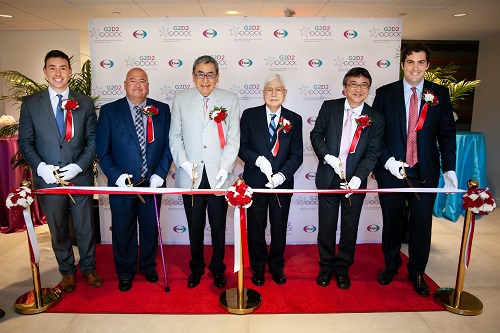
(Standing from left to right) Ryan Fattman, U.S. Senator for Massachusetts; Mike Belleville, patient living with dementia; Haruo Naito, Eisai CEO; Yoshito Kishi, Morris Loeb Professor of Chemistry, Harvard University; Yasushi Nakamura, Acting Consul General at Consulate General of Japan in Boston; Mark Fuller, Undersecretary for Business Growth, Executive Office of Economic Development.
G2D2 integrates Eisai’s strengths cultivated from human genetics, data sciences and precision chemistry for the novel drug discovery approach, and this approach will focus on the immunodementia to expand Eisai’s dementia pipeline beyond amyloid-beta (Aβ) and tau. Specifically, G2D2 will leverage human genetics and human biology to attempt to discover potential innovative medicines for dementia, which target the brain’s immune system.
G2D2 is located in Cambridge, Massachusetts, one of the world’s leading biotechnology clusters where academic institutions and private research organizations are concentrated, and will collaborate with the world-class science. Taking advantage of the benefits of its location, The Eisai Incubator for NeuroDiscovery (e-IND) will provide space to Cambridge-based start-up/spin-out companies conducting high-risk but potentially transformative research that can impact the discovery of breakthrough neuroscience therapeutics. G2D2 also plans to contribute to the development of next-generation scientific leaders in the Boston and Cambridge areas through internships, training programs and postdoctoral fellowships in genetics and drug discovery science.
With the full-scale operation of G2D2, Eisai is striving to discover innovative dementia treatments using a multi-dimensional, comprehensive approaches to fulfill unmet needs and increase the benefits for patients and their families.
Media Inquiries:
Public Relations Department,
Eisai Co., Ltd.
+81-(0)3-3817-5120
[Notes to editors]
1.About Immunodementia
Drug discovery targets supported by human genetics have been demonstrated to have a higher probability of success than drug targets that are not. Large-scale genetic and other studies of Alzheimer’s disease have highlighted neuro-immune regulating factors of a particular cell-type, microglia, as likely being causal in the onset of dementia. Integrating cutting-edge strengths in human genetics, data sciences and precision chemistry, G2D2 will focus on a new research theme of immunodementia, a novel genetically validated target modulating immune mechanism that treats dementia, to extend Eisai’s discovery pipeline beyond targeting amyloid and tau. Under the medium-term business plan EWAY2025 currently in progress, immunodementia is a Ricchi (an area where real patient needs are unmet and Eisai can become a frontrunner) in neurology.
2. Eisai’s Initiatives for Dementia Research
Eisai possesses experience cultivated through over 35 years of drug creation activities in the dementia area, including the development of Aricept® as a standard treatment for Alzheimer’s disease, as well as a rich development pipeline. With Tsukuba Research Laboratories as its hub, the company is working on global exploratory development of research for dementia treatments using a multi-dimensional, comprehensive approaches by following global research sites:
- ・Tsukuba Research Laboratories (Japan): A hub for drug discovery research with abundant experiences in small molecules for the central nervous system;
- ・G2D2 (U.S.): Research on Immunodementia with the strengths in human genetics, data sciences and precision chemistry;
- ・KAN Research Institute (Kobe, Japan): Research on glial cell based on cellular biology;
- ・European Knowledge Centre (Hatfield, U.K.): Open innovation drug discovery through cooperation with U.K. academia; and
- ・Eisai-Keio Innovation Lab for Dementia (Japan): Brain defense mechanism research based on reverse translation.
3. Photographs of Inside and Outside of G2D2
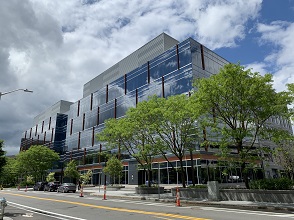
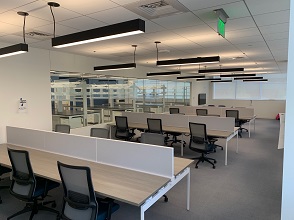
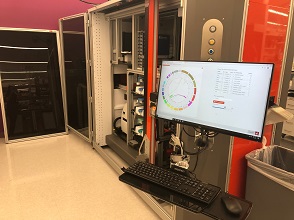
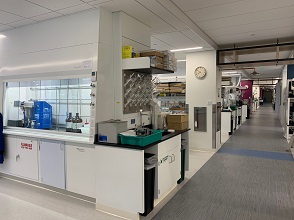
(Space of Precision Chemistry)
